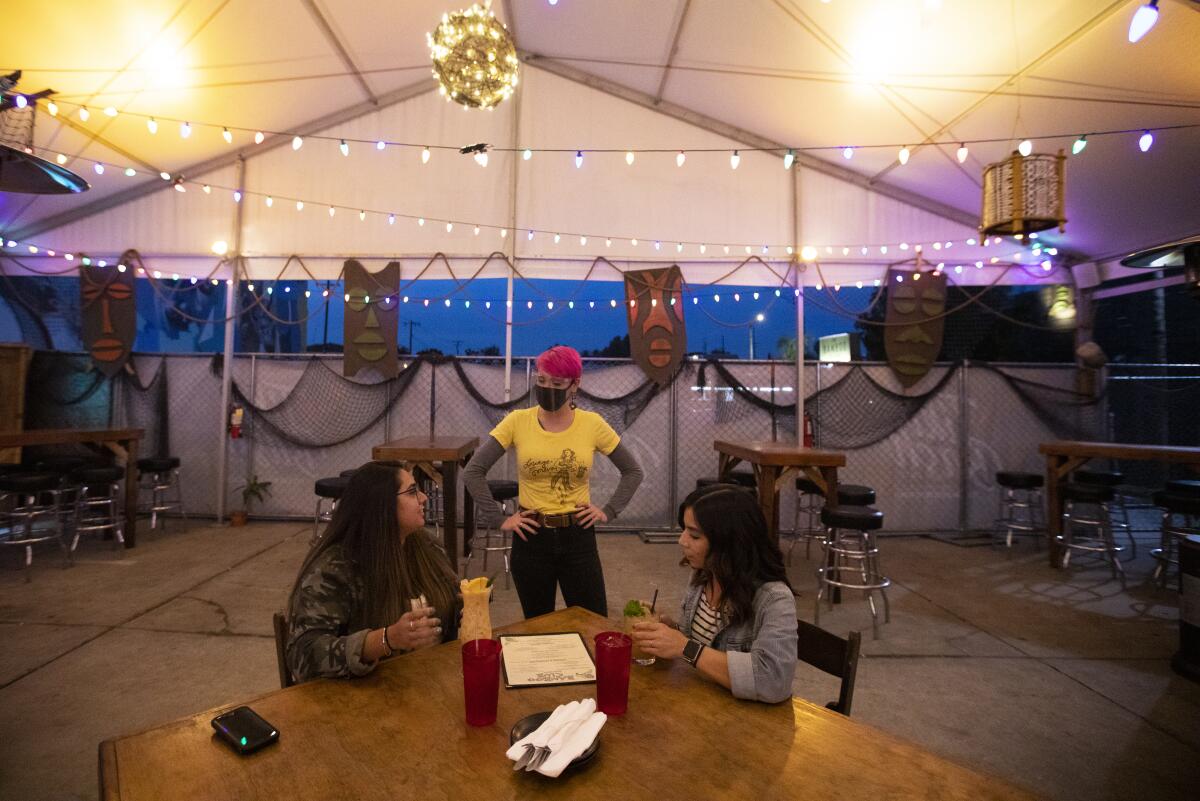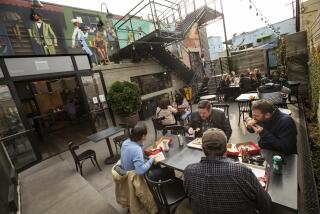It’s not outdoor dining that worries us, but human nature

- Share via
With COVID-19 cases growing exponentially, Los Angeles County public health officials have ordered the suspension of outdoor dining at restaurants for three weeks starting Thanksgiving Day. It’s the latest escalation of business restrictions stemming from this surge, and with cases hitting a new high Monday — 6,124 — it will likely not be the last.
The temporary shutdown seems logical in the face of the increasingly dangerous circumstances. Infections are spread by people mixing with others. Anything that authorities can do to reasonably limit the nonessential activities that bring people and their possible contagions together, they should do. The curfew imposed last week that required nonessential businesses to close from 10 p.m. to 5 a.m. was a good example.
But this new order gives us pause. Not because public health officials are wrong to shut down locations where people get together without protective face coverings or because restaurants have invested thousands to build outdoor dining areas (an investment that we think will pay off for years to come in temperate Los Angeles). No, it’s human nature that has us concerned.
Private social gatherings have been one of the most significant sources of spread since the beginning of the pandemic. Despite the risk engendered and the endless appeals by public officials to cut it out, people keep socializing in unsafe ways. Though indoor gatherings are prohibited, it’s much harder to enforce what people do behind closed doors than in full view in a public place. If shutting down outdoor dining simply moves small gatherings from a restaurant patio that is following strict infection-control measures to a dining room in a private home that is not, it could actually increase spread.
This is not an idle worry, but one based on frustrating experience. Public health officials had pinned previous COVID-19 surges to social gatherings during holiday weekends, celebrations and sports events. And that was in the warmer months. With chillier evenings, those gatherings are going to move inside.
We’ve consistently supported a scientific, data-driven approach to pandemic responses that identifies sources of infection spread. And the science says that infections spread much better indoors, where air doesn’t circulate as well. Meanwhile, there’s little data showing that outdoor dining is a major source of infection.
According to Los Angeles County Supervisor Kathryn Barger, who is opposed to the new order, county data show that only about 15% of people who have tested positive reported dining out with someone who tested positive. Conversely, more than half of infected people have reported attending private gatherings with someone who tested positive, she said. The Centers for Disease Control and Prevention guidelines put indoor dining at high risk and outdoor dining at lower risk.
But Barbara Ferrer, Los Angeles County’s public health director, defended the new orders Monday, saying that nearly 80% of food service businesses inspected have been found out of compliance with distancing guidelines. Furthermore, she said that it’s “completely impossible” to know exactly how many people caught COVID-19 from eating out al fresco. “Most people that we interview, they have no idea where they may have become infected,” Ferrer said. Instead public health officials rely on broad guidelines to craft policies such as the one that says activities that involve the removal of protective face coverings, such as dining, heighten risk.
At this point, it may not be enough to rely on these guidelines to control the spread. L.A. County businesses have been subjected to multiple clampdowns — closing, reopening and modifying, now closing again — and yet it has not stopped COVID-19 from spreading. Something is not working, and it may well be due to what’s happening behind closed doors. Let’s not give the public more reason to gather there.
More to Read
A cure for the common opinion
Get thought-provoking perspectives with our weekly newsletter.
You may occasionally receive promotional content from the Los Angeles Times.






